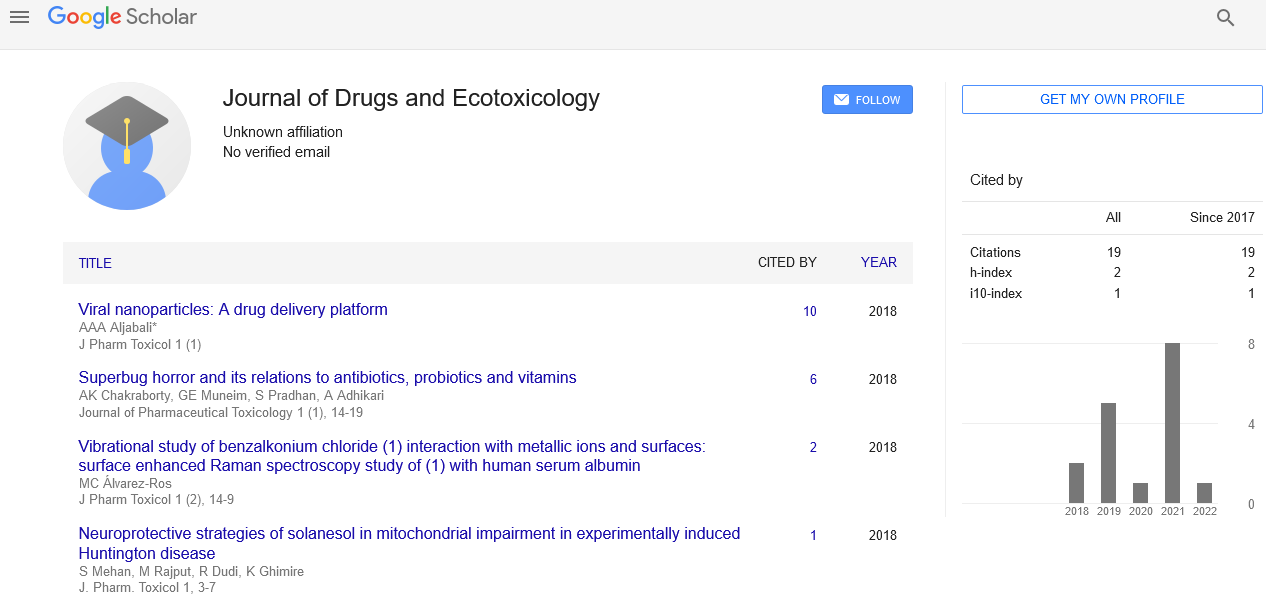Drug safety in patients taking methotrexate for inflammatory arthritis
Received: 03-Mar-2022, Manuscript No. puljde-22-5236; Editor assigned: 05-Mar-2022, Pre QC No. puljde-22-5236 (PQ); Accepted Date: Mar 22, 2022; Reviewed: 21-Mar-2022 QC No. puljde-22-5236 (Q); Revised: 21-Mar-2022, Manuscript No. puljde-22-5236 (R); Published: 29-Mar-2022, DOI: 10.37532.puljde.22.5.2.16
Citation: Hoffman E. Drug safety in patients taking methotrexate for inflammatory arthritis. J Drug E. 2022: 5(2):16.
This open-access article is distributed under the terms of the Creative Commons Attribution Non-Commercial License (CC BY-NC) (http://creativecommons.org/licenses/by-nc/4.0/), which permits reuse, distribution and reproduction of the article, provided that the original work is properly cited and the reuse is restricted to noncommercial purposes. For commercial reuse, contact reprints@pulsus.com
Abstract
Inflammatory arthritis is frequently treated with methotrexate. Concurrent use of Non-Steroidal Anti-Inflammatory Medicines (NSAIDs), such as aspirin, paracetamol (acetaminophen), or both, has raised questions about their safety. The safety of methotrexate alone versus methotrexate combined with NSAIDs, such as aspirin, paracetamol, or both, has been compared in both randomized controlled trials and non-randomized studies in patients with inflammatory arthritis.
Introduction
Reumatoid arthritis, ankylosing spondylitis, psoriatic arthritis, and other forms of spondyloarthritis are all included in the category of disorders known as "inflammatory arthritis." Your immune system, which typically fights illness, targets your joints when you have inflammatory arthritis. Your joints become painful, stiff, and swollen as a result. The tiny joints in your hands and feet are typically the first to be impacted by rheumatoid arthritis. In contrast, the spine's joints are most severely impacted by ankylosing spondylitis. Since there is currently no cure for inflammatory arthritis, treatments focus on reducing pain and stiffness while also enhancing mobility.
As a result, people with inflammatory arthritis frequently require the usage of medicines like paracetamol and NSAIDs like aspirin or ibuprofen to assist manage their discomfort. While Non-Steroidal Anti-Inflammatory Medicines (NSAIDs) like aspirin, ibuprofen, diclofenac, and cyclooxygenase-2 inhibitors or COX-2s (like celecoxib) are used to reduce pain and swelling, paracetamol, often known as acetaminophen, is used to treat pain but does not reduce swelling.
One of the drugs that is most frequently used to treat persons with inflammatory arthritis is methotrexate. A disease-modifying antirheumatic medication is methotrexate. By lowering immune system activity, methotrexate helps treat rheumatoid arthritis. A typical treatment for rheumatoid arthritis is methotrexate, which is sometimes used in conjunction with other medications, particularly for patients who do not respond well to methotrexate by itself. Methotrexate and other disease-modifying anti-rheumatic medications are available as tablets, capsules, and occasionally injections. Sadly, there have previously been some worries that it would not be safe to combine methotrexate with the medications that patients with inflammatory arthritis frequently need to take.
The majority of the studies were of low to moderate quality, and the study period wasn't always explicitly stated. These studies found no evidence of an increased risk of methotrexate-induced pulmonary disease in two of them, no evidence of an increased risk of renal or liver dysfunction in one, no evidence of an increased risk of methotrexate withdrawal in three, and no evidence of an increased risk of any adverse events, including severe toxic reactions, in another. One research, however, showed temporary thrombocytopenia to occur when NSAIDs were taken on the same weekday as methotrexate. The findings of this study, which was a retrospective analysis with just a small number of participants and moderate quality, have not since been verified.
The majority of these studies were of mediocre quality. Although adverse events were reported as a secondary outcome, the investigations were predominantly pharmacokinetic studies. With concurrent use of piroxicam or etodolac, there were no clinically significant negative effects; however, celecoxib or etoricoxib only caused mild negative effects, such as headaches, nausea, and vomiting. Trials found no evidence of an increased risk of methotrexate-induced pulmonary illness, and two investigations found no increase in any adverse events, including serious toxic reactions; however, none of these studies stated the amount of aspirin that was taken. One study found that taking aspirin together had a negative impact on liver function at a mean dose of 6.84 aspirin tablets per day, which translates to a potential daily intake of 2.1 g if 300 mg aspirin tablets were consumed. Another trial reported that taking 2 gm of aspirin daily could partially reverse the loss in renal function. One trial only lasted a week, but it found no increase in side effects when taking 975 gM of aspirin daily.





